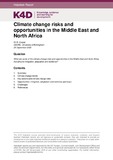| dc.contributor.author | Cooper, Rachel | |
| dc.coverage.spatial | MENA | en |
| dc.date.accessioned | 2020-11-24T15:22:50Z | |
| dc.date.available | 2020-11-24T15:22:50Z | |
| dc.date.issued | 2020-09-25 | |
| dc.identifier.citation | Cooper, R. (2020). Climate Change risks and opportunities in the Middle East and North Africa. K4D Helpdesk Report. Brighton, UK: Institute of Development Studies. | en |
| dc.identifier.uri | https://opendocs.ids.ac.uk/opendocs/handle/20.500.12413/15798 | |
| dc.description.abstract | This rapid review examines evidence on the climate change risks and opportunities in the Middle East and North Africa, including for mitigation, adaptation and resilience. Climate change is likely to compound existing development challenges in the Middle East and North Africa (MENA), particularly the water crisis and the high dependence on food imports. Water scarcity is a defining challenge in the region and a driver of the region’s reliance on food imports. The review notes that water stress in the region is not simply a matter of scarcity, but of poor management and governance. In addition to this, the review also finds that despite a huge renewable energy potential across the region, there is an extremely high reliance on hydrocarbons for energy. It also find that climate change may contribute to migration and could act as a threat multiplier in the region. The review highlights some opportunities for mitigation, adaptation and resilience including strengthening regional adaptive capacity with regional natural resource management, develop the region’s solar and wind energy potential and adaptation or concessional finance in the region. This rapid literature review draws on peer reviewed, practitioner and grey literature. This review found a relatively large evidence base related to the water crisis in MENA and climate change trends in the region, as well as a relatively large evidence base related to the region’s political economy. Potential evidence gaps identified by the searches undertaken for this review include: climate finance flows in the region; and, green growth and low carbon growth, aside from renewable energy potential, in the peer reviewed literature. More targeted searches are needed to ascertain whether these are indeed evidence gaps. Nature-based solutions were not considered in this study as the author was aware an independent assessment study has been commissioned. | en |
| dc.description.sponsorship | FCDO (Foreign, Commonwealth and Development Office) | en |
| dc.language.iso | en | en |
| dc.publisher | Institute of Development Studies | en |
| dc.relation.ispartofseries | K4D Helpdesk Report;894 | |
| dc.rights.uri | https://www.nationalarchives.gov.uk/doc/open-government-licence/version/3/ | en |
| dc.subject | Climate Change | en |
| dc.subject | Environment | en |
| dc.subject | Governance | en |
| dc.title | Climate Change Risks and Opportunities in the Middle East and North Africa | en |
| dc.type | Helpdesk | en |
| dc.rights.holder | © Crown copyright 2020 | en |
| dcterms.dateAccepted | 2020-09-25 | |
| rioxxterms.funder | Department for International Development, UK Government | en |
| rioxxterms.identifier.project | K4D | en |
| rioxxterms.version | VoR | en |
| rioxxterms.funder.project | 238a9fa4-fe4a-4380-996b-995f33607ba0 | en |

